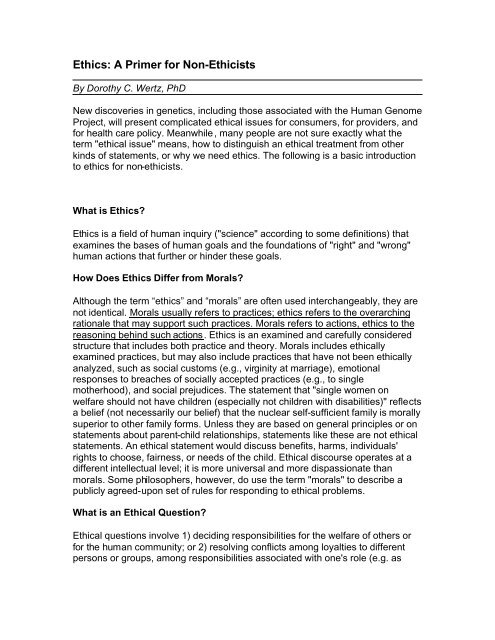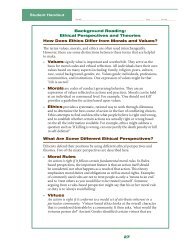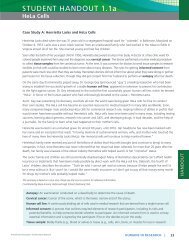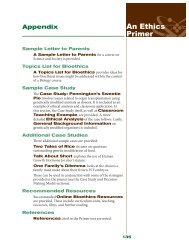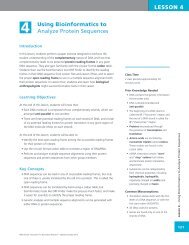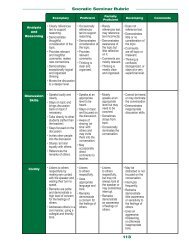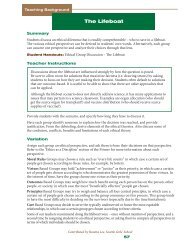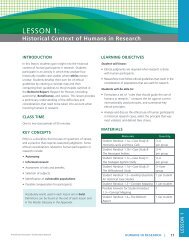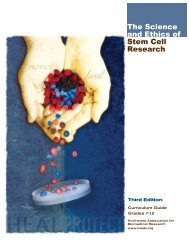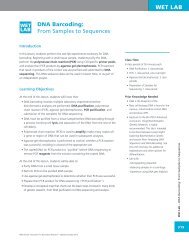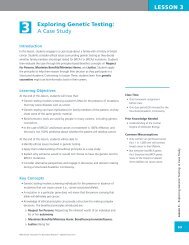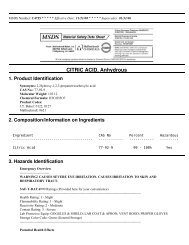Ethics: A Primer for Non-Ethicists (PDF) - ASPB News
Ethics: A Primer for Non-Ethicists (PDF) - ASPB News
Ethics: A Primer for Non-Ethicists (PDF) - ASPB News
Create successful ePaper yourself
Turn your PDF publications into a flip-book with our unique Google optimized e-Paper software.
<strong>Ethics</strong>: A <strong>Primer</strong> <strong>for</strong> <strong>Non</strong>-<strong>Ethicists</strong><br />
By Dorothy C. Wertz, PhD<br />
New discoveries in genetics, including those associated with the Human Genome<br />
Project, will present complicated ethical issues <strong>for</strong> consumers, <strong>for</strong> providers, and<br />
<strong>for</strong> health care policy. Meanwhile, many people are not sure exactly what the<br />
term "ethical issue" means, how to distinguish an ethical treatment from other<br />
kinds of statements, or why we need ethics. The following is a basic introduction<br />
to ethics <strong>for</strong> non-ethicists.<br />
What is <strong>Ethics</strong><br />
<strong>Ethics</strong> is a field of human inquiry ("science" according to some definitions) that<br />
examines the bases of human goals and the foundations of "right" and "wrong"<br />
human actions that further or hinder these goals.<br />
How Does <strong>Ethics</strong> Differ from Morals<br />
Although the term “ethics” and “morals” are often used interchangeably, they are<br />
not identical. Morals usually refers to practices; ethics refers to the overarching<br />
rationale that may support such practices. Morals refers to actions, ethics to the<br />
reasoning behind such actions. <strong>Ethics</strong> is an examined and carefully considered<br />
structure that includes both practice and theory. Morals includes ethically<br />
examined practices, but may also include practices that have not been ethically<br />
analyzed, such as social customs (e.g., virginity at marriage), emotional<br />
responses to breaches of socially accepted practices (e.g., to single<br />
motherhood), and social prejudices. The statement that "single women on<br />
welfare should not have children (especially not children with disabilities)" reflects<br />
a belief (not necessarily our belief) that the nuclear self-sufficient family is morally<br />
superior to other family <strong>for</strong>ms. Unless they are based on general principles or on<br />
statements about parent-child relationships, statements like these are not ethical<br />
statements. An ethical statement would discuss benefits, harms, individuals'<br />
rights to choose, fairness, or needs of the child. Ethical discourse operates at a<br />
different intellectual level; it is more universal and more dispassionate than<br />
morals. Some philosophers, however, do use the term "morals" to describe a<br />
publicly agreed-upon set of rules <strong>for</strong> responding to ethical problems.<br />
What is an Ethical Question<br />
Ethical questions involve 1) deciding responsibilities <strong>for</strong> the welfare of others or<br />
<strong>for</strong> the human community; or 2) resolving conflicts among loyalties to different<br />
persons or groups, among responsibilities associated with one's role (e.g. as
consumer or provider), or among principles. Ethical questions include (or imply)<br />
the words "ought" or "should".<br />
Although we frequently hear the term “ethical dilemma”, many ethical problems<br />
are not dilemmas. They are even more complicated. A "dilemma", from the<br />
Greek di (two) and lemma (assumption), means a confrontation in which both<br />
alternatives have an equal likelihood of causing harm (or benefit). Many ethical<br />
problems in genetics present more than two alternatives and are there<strong>for</strong>e not<br />
dilemmas, but trilemmas or quadrilemmas.<br />
What Is an "Ethical" Response to an Ethical Question<br />
Many people use non–ethical reasoning to respond to ethical questions. <strong>Non</strong>–<br />
ethical reasons are not necessarily "unethical" or harmful; they simply avoid the<br />
difficulty of ethical thinking.<br />
Examples of <strong>Non</strong>–Ethical Statements<br />
Sometimes people use technical, scientific, legal, religious, or institutional policy<br />
statements to answer the question, "What should I do" These are not ethical<br />
statements because they do not include a rationale that transcends particular<br />
institutions. Here are some examples of non-ethical responses to ethical<br />
problems:<br />
(1) "Technology will eventually solve this problem."<br />
For example, suppose someone refuses to give blood <strong>for</strong> a DNA sample that<br />
could provide useful genetic in<strong>for</strong>mation to other members of the family. What<br />
should the genetics services provider do<br />
The answer that "In the future direct DNA testing on the family members will be<br />
possible so this situation will not occur" is not an ethics based response. Many<br />
geneticists prefer technological answers because they appear to be the simplest<br />
solutions. Technology, however, will not obviate all difficult decisions. Direct DNA<br />
testing may eliminate the problem of family cooperation <strong>for</strong> some genetic testing,<br />
but may pose new problems, <strong>for</strong> example, increased requests <strong>for</strong> testing by<br />
employers or insurers. One should not look to scientific discoveries to remove or<br />
solve ethical problems.<br />
(2) "The law requires or prohibits this."<br />
Fear of lawsuits plays a role in many medical decisions. For example, in<br />
response to the question of whether to disclose fetal sex to a couple who may<br />
terminate a pregnancy solely on the basis of sex, some providers say disclosure<br />
is a legal requirement and proceed no further in their reasoning. If a pregnant<br />
woman's separated husband asks <strong>for</strong> the results of her prenatal diagnostic tests,
against her wishes, some providers also base their answers on presumed legal<br />
prohibitions or requirements. (Their legal knowledge in both cases may be faulty,<br />
but that is a subject <strong>for</strong> another paper. Laws are not as restrictive as many<br />
people think.) Although laws are often based on the collective moral experience<br />
of a community, ethics transcends law, applies to more situations, provides<br />
more guidance and more general rules. Decisions made solely on the basis of<br />
following legal regulations are not ethical decisions.<br />
(3) "My institution, department, or supervisor requires (or <strong>for</strong>bids) this."<br />
Authorities can be wrong. Throughout history, millions of people have been killed<br />
by employees who were simply following their employer's rules and doing their<br />
jobs. In a democratic society, institutional policies should be established by those<br />
who will use them. They also should be re-reviewed periodically to keep pace<br />
with scientific, cultural, and social developments. A decision based on policy that<br />
the decision-maker has had a hand in establishing or reviewing, or at least has<br />
carefully considered, may be an ethical decision, provided that the policy itself<br />
has underlying ethical principles. Merely following institutional policy <strong>for</strong> its own<br />
sake, however, is not an ethical response to the question "What should I do"
Examples of Reasoning Based on Principals of <strong>Ethics</strong><br />
Examples of Reasoning 'Based On Principals of <strong>Ethics</strong><br />
Autonomy<br />
Counselors should be nondirective, support whatever decision clients make;<br />
patient requests shotild be respected, whether they're right or wrong; optimal<br />
choices are based upon use of medical/genetic in<strong>for</strong>mation; patients' rights to know<br />
or not to know; honesty, obligation to tell the truth; refusal to lie ; right to privacy or<br />
confidentiality; doctorpatient relationship (trust); rights to referral.<br />
Beneficence<br />
Removal of guilt or anxiety now, help with present problems; physician's<br />
responsibility to provide health care <strong>for</strong> family, society; the "Golden Rule" of<br />
Christian tradition: do unto others as you would have others do unto you; benefits<br />
outweigh possible harm; means of truthtelling so as to maxindze good (means of<br />
teUing truth, support, counseling, referrals); farnily planning, makingin<strong>for</strong>med<br />
reproductive choices; prepare patient <strong>for</strong> the future, including help cope with<br />
stresses of disease or abortion; improvement of life of future generations; health<br />
care; social planning; insurance coverage; workers'health (includes responsibility<br />
of factory to worker); working conditions; social unity; protection of persons through<br />
regulation or licensing of labs and providers; (insure proper level of service, quality<br />
control) to prevent nLisuse; common good, public health, public safety; population<br />
limitation, maintain balanced sex ratio; eugenic arguments cost to society<br />
(although eugenics is now associated mostly with harm, most eugerLicists thought<br />
they were doing good).<br />
Justice<br />
Equal access; entitlement to full insurance coverage; right to medical care that is<br />
af<strong>for</strong>dable; fairness or unfairness; they deserve or don't deserve the service;<br />
interests of the fetus ought to be treated equally with those of living persons; use<br />
resources wisely, don't waste resources; appropriate or inappropriate use<br />
oftechnology medical indication or no medical indication; this is a misuse of the<br />
service; all available services should be provided on request.<br />
<strong>Non</strong>–Maleficence<br />
Do no harm (the Hippocratic Oath); preserve family unity, resolve conflict through<br />
discussion truth telling to avoid harm; truth telling as a source of harm; no benefit<br />
gained from truth telling (no need to know); avoid potential misuse of in<strong>for</strong>mation<br />
by third parties; avoid social stigmatization, discrimination in the workplace or<br />
elsewhere; avoid harm through regulations or government intervention; avoid harm<br />
to society if sex ratio upset; parent's request serves no useful purpose; don't set a<br />
precedent that will harm the moral order ("slippery slope"argument).<br />
Strict Ultilitarianism<br />
Efficiency or utility; costbenefit analysis; protection of econonLic interest of third<br />
parties; consumers have a right to whatever service they can pay <strong>for</strong> out of pocket.
(4) "The Bible tells me so."<br />
Religon and ethics is closely linked. <strong>Ethics</strong> is a part of all major religions.<br />
However, ethics is not identical with religion; ethical reasoning must be<br />
understandable outside the framework of particular religious beliefs. For<br />
example, to say "I would do this because the Bible tells me so" is not an ethical<br />
answer. Over the centuries, people have interpreted the Bible differently. To<br />
make an answer based on the Bible into an ethical statement, one would have to<br />
explore the reasons why the Bible makes this statement and then explain this in<br />
terms meaningful to someone with a different interpretation of the Bible or no<br />
experience of the Bible at all. The statement that ';God said this" is inherently<br />
unsatisfactory because it falls back on a legal/ policy/ authoritarian approach. It is<br />
also particularly unsuitable <strong>for</strong> providers in a multicultural society. An ethics<br />
based interpretation of religious approaches almost inevitably uses principles or<br />
relationships.<br />
(5) "I disapprove of this!"<br />
This statement appears frequently in answers to questions about sex selection.<br />
This knee-jerk response includes no ethical reflection whatsoever, merely the<br />
emotion of the moment. Although ethical principles may underlie the response, it<br />
is not an ethical statement in itself.<br />
Examples of Ethical Statements<br />
Ethical statements may be based on 1) principles; 2) action-rules or action<br />
guides which are in<strong>for</strong>mal statements based on principles; 3) relationships; or 4)<br />
a combination. The principles-based approach is most common in ethical<br />
textbooks and discussions. . The action guide approach appears to be most<br />
common in geneticists' actual reasoning, at least according to the survey<br />
responses of almost 800 U.S. geneticists and counselors.<br />
In biomedical ethics, five general principles are commonly discussed:<br />
Five general principles provide the foundation <strong>for</strong> most reasoning in<br />
biomedical ethics:<br />
1. Autonomy (Respect <strong>for</strong> Persons): the duty to respect the self-determination<br />
and choices of autonomous persons, as well as to protect persons with<br />
diminished autonomy, e.g., young children, mentally retarded persons, and those<br />
with other mental impairments.<br />
2. <strong>Non</strong>-maleficence: the obligation to remove or minimize harm, to persons and<br />
wherever possible to remove the causes of farm altogether.
3. Beneficence: the obligation to secure the well-being of persons by acting<br />
positively on their behalf, and moreover, to maximize the benefits that can be<br />
attained. Beneficence goes beyond non-maleficence in not only avoiding harm<br />
but purposefully trying to do good.<br />
4. Justice: the obligation to distribute benefits and burdens fairly, to treat equals<br />
equally and to give reasons <strong>for</strong> differential treatment based upon widely accepted<br />
criteria <strong>for</strong> just ways to distribute benefits and burdens.<br />
5. Strict Monetary Utilitarianism: economic interests or material ends have the<br />
highest priority in reasoning. Although most people think of utilitarianism as<br />
promoting "the greatest good to the greatest number," utilitarian philosophy<br />
originated from monetary theory. In the above analysis, the "beneficent" aspects<br />
of utilitarianism have been separated from the monetary or efficiency aspects.<br />
Autonomy is the most common principle underlying decisions in the U.S. and<br />
other Western nations. This view is shared by providers and consumers alike.<br />
There appears to be a trend toward providing all services requested, provided<br />
only that the consumer can pay out of pocket. Justice and equity concerns are<br />
rarely mentioned, though they should be of paramount importance in a nation<br />
debating health care re<strong>for</strong>m.<br />
Action–guides<br />
An action–guide is a practical rule <strong>for</strong> action that is principles based. Often,<br />
instead of saying "autonomy," or "obligation to tell the truth," people say, "the<br />
patient should make up her own mind" or "I should educate the patient."<br />
According to Beauchamp and Childress (1994), these in<strong>for</strong>mal statements that<br />
relate to principles should be called "action rules." These, rather than the more<br />
<strong>for</strong>mally stated principles, are the approaches used by most U.S. medical<br />
geneticists and genetic counselors.<br />
Relationships-Based Approaches<br />
Relationships–based ethics incorporates the needs and deserts (special "extras"<br />
owed to certain persons or groups because of prior suffering or discrimination) of<br />
all parties concerned, as well as the more <strong>for</strong>mal concepts of rights, obligations,<br />
and good of society. Relationships–based ethics are found in the psychological<br />
research of Carol Gilligan and the feminist bioethics of Susan Sherwin, Christine<br />
Overall, and others. Such an ethics appears to be an ideal framework <strong>for</strong><br />
consumer provider interaction.<br />
The National Society of Genetic Counselors (NSGQ has adopted a relationships<br />
based Code of <strong>Ethics</strong> that incorporates four type of relationships: 1) with self; 2)<br />
with client; 3) with colleagues; and 4) with society.
The NSGC Code includes guidelines <strong>for</strong> evaluating a potential choice of action in<br />
the light of its effect on each type of relationship. Other relationships affecting<br />
ethical decisions in genetics include relationships with the client's family, with<br />
institutions (schools, employers, insurers), and with one's own sense of<br />
professional integrity, and the client's own relationships with spouse or partner<br />
and with family members.<br />
In responding to our current survey of geneticists, however, very few providers<br />
speak of relationships in their reasoning; they seem to prefer action guides or<br />
even <strong>for</strong>mal principles over relationships. A relationships–based approach has<br />
much to offer, and should be used more frequently.<br />
Consequentialist versus <strong>Non</strong>-consequentialist Approaches.<br />
Classic utilitarianism U.S. Mill, Jeremy Bentham) is based on consequences.<br />
Aristotle and Thomas Aquinas were also goal oriented ("teleological") thinkers.<br />
"Deontological" theories (Kant) are based on following rules, regardless of<br />
consequences. Many approaches combine the two (e.g., rule-utilitarianism). In a<br />
1985 survey of 295 U.S. geneticists, 36% mentioned specific outcomes of their<br />
ethical decisions.<br />
Why is <strong>Ethics</strong> Important<br />
Neither consumers nor providers can base their actions solely on technological,<br />
legal, or institutional policy grounds or on immediate emotional responses.<br />
Decisions based on external authorities, made without careful thought, lead to.<br />
authoritarian societies. Technology and law will not solve ethical problems. We<br />
need a meaningful rationale behind our decisions. This rationale should be<br />
understandable to, and shared by, members of the different cultural and racial<br />
groups that make up the U.S. population. We also need consistency in our<br />
actions. <strong>Ethics</strong> enables people to think <strong>for</strong> themselves, and to consider interests<br />
of all parties concerned. <strong>Ethics</strong> is important because private decisions may lead<br />
to cultural trans<strong>for</strong>mations. <strong>Ethics</strong> helps us to look beyond the details of the<br />
immediate situation.<br />
Suggested Readings:<br />
Beauchamp, Tom L., and Childress, James F. Principles of Biomedical <strong>Ethics</strong>,<br />
Fourth Edition. New York: Ox<strong>for</strong>d University Press, 1994.<br />
Fletcher, John C. <strong>Ethics</strong> and Human Genetics: A Crosscultural Perspective.<br />
Pages 457490 in Wertz, Dorothy C. and Fletcher, John C. (eds.) <strong>Ethics</strong> and<br />
Human Genetics: A Crosscultural Perspective. Heidelberg: Springer<br />
Verlog, 1989.
Gilligan, Carol. In a Different Voice: Psychological Theory and Women's<br />
Development. Cambridge, MA: Harvard University Press, 1982.<br />
National Society of Genetic Counselors, Code of <strong>Ethics</strong>. Journal of Genetic<br />
Counseling, Vol. 1, no. 1, March 1992, pp. 41-44.<br />
Overall, Christine. <strong>Ethics</strong> and Human Reproduction: A Feminist Analysis.<br />
Boston: Allen & Unwin, 1987.<br />
Sherwin, Susan. No Longer Patient: Feminist <strong>Ethics</strong> in Health Care.<br />
Philadelphia: Temple University Press, 1992.<br />
Wertz, Dorothy C., and Fletcher, John C. Privacy and Disclosure in Medical<br />
Genetics Examined in an <strong>Ethics</strong> of Care. Bioethics 5 (3); 1991: 212-232.<br />
Some New England <strong>Ethicists</strong> Working on Issues in Genetics<br />
George J. Annas Bernard Gert Susan P. Staf<strong>for</strong>d<br />
Health Law Section Inst. For the Study of Dept. of Philosophy<br />
Boston University School Applied and Professional <strong>Ethics</strong> Simmons College<br />
Of Public Health Dartmouth College 300 The Fenway<br />
80 East Concord Street Hanover, NH 03755 Boston, MA<br />
Boston, MA 02118 617-521-2210<br />
617-638-5042 Helen B. Holmes<br />
24 Berkshire Terrace Caroline Whitbeck<br />
Dan Brock Amherst, MA 01002 Massachusetts inst.<br />
Department of Philosophy 413-549-1226 of Technology<br />
Brown University<br />
Building 3, Rm 137C<br />
54 College Street Thomas A. Shannon Cambridge, MA 02139<br />
Providence, RI 02912 Dept. of Humanities 617-253-1631<br />
Worcester Polytechnic Inst.<br />
100 Institute Road<br />
Worcester, MA 01609<br />
508-831-5468<br />
The Genetic Resource Vol. 10, No. 1 1996


